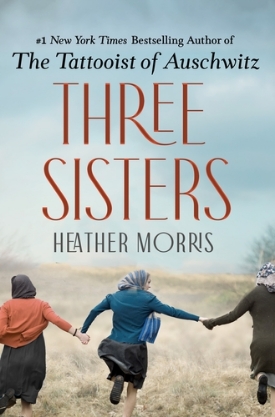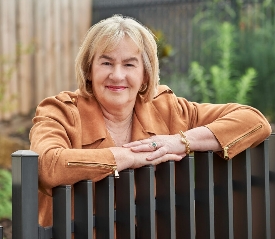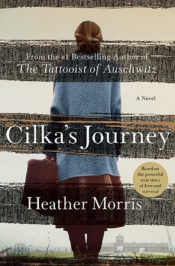 Synopsis:
Synopsis:
I want you to make a promise to me that you will always take care of your sisters. That you will always be there for one another. That you will not allow anyone to take you away from each other, ever. Do you understand?
When they are little girls, Cibi, Magda and Livi, promise their father that they will stay together, no matter what.
Years later, at just fifteen years of age, Livi is ordered to Auschwitz by the Nazis. Cibi, only nineteen at the time, remembers their promise and follows Livi, determined to protect her sister . . . or die with her. Together, they fight to survive through unimaginable cruelty and hardship.
Back in their hometown in Slovakia, Magda, only seventeen, stays with their mother and grandfather, hiding in a neighbor’s attic or in the forest when the Nazi militia come to round up friends, neighbors and family. She escapes for a time, but eventually she too is captured and transported to Auschwitz-Birkenau.
In the horror of the death camp, the three sisters are reunited. Though traumatized by their experiences, they are together.
And remembering their father, they make a new promise to each other: They will survive.
Their fight for survival takes them from the hell of Auschwitz to a death march across war-torn Europe and, eventually, home to Slovakia, now under iron Communist rule. Determined to begin again, they embark on a voyage of renewal to the new Jewish homeland, Israel.
A promise to stay together.
An unbreakable bond.
A fierce will to survive.
Three Sisters is a story of hope in the hardest times, how a promise to their father and each other kept them alive, and finding love after loss. Two of the sisters are alive, living in Israel surrounded by friends and family. They chose author Heather Morris to reimagine their story.
Review:

“Sometimes the stars align and, by a million to one chance, you discover that dreams, every now and then, do come true,” writes Oded Ravek, Livi’s son. In 2019, The Tattooist of Auschwitz caught his eye as he was shopping, so he purchased it to read while traveling to Israel to visit family. He gave the book to his mother, who discovered it was about Lale Sokolov and his wife, Gita, Livi’s schoolmate. Oded emailed author Heather Morris and arranged for her to meet Livi and her family. Soon, Oded’s long-held desire to see the story of his mother and her two sisters told was coming true.
Oded describes their story as “a testament to the power of love and devotion. Against all odds, the three sisters survived the most heinous, systematic genocide that the world has ever known. And yet they went on to live . . . lives full of laughter, fulfillment and joy, always surrounded by love, with each successive generation of sons, daughters, grandchildren and great-grandchildren growing and thriving in freedom.”
Three Sisters is the harrowing but inspiring tale of Cibi, Magda and Livi, who grew up in Slovakia. As the book opens, their father was wounded during World War I and, twelve years later, will undergo surgery to remove a bullet lodged in his neck. Before the procedure, he asks his three young daughters to promise to him and each other that they will “always be there for one another, no matter what. That you will not allow anything to take you away from each other.” The next day he dies on the operating table, and their maternal grandfather, Yitzchak, moves into their small cottage to assist their mother, Chaya. Their uncle, Ivan, lives across the street with his family and provides support, as well.
Thirteen years later, in 1942, the girls begin to comprehend the importance and ramifications of the promise. Rumors are rampant in their village that the Nazis are forcing Jewish boys and girls sixteen years old and older to work for them. Seventeen-year-old Magda falls ill, so the doctor hospitalizes her in order for her to remain safe — at least for the time being. Livi is fifteen and the eldest, Cibi, has gone away to a training program that provides young people the necessary skills to begin a new life in Palestine. But Cibi soon returns home to find that Livi has indeed been ordered to report to the synagogue. From there, she will be transported to an undisclosed location, allegedly to work for the Germans. Cibi assures her mother that she will accompany Livi. As their mother sobs in the doorway, the two girls bravely proceed to the synagogue where they, along with many others, are herded into a classroom. After a long night there, they are marched down the streets to the train station. As Cibi and Livi pass by, they are stunned to discover that “their former friends and neighbors are hurling rotten fruit and stale bread at their heads, yelling their joy that the Jews are finally leaving.” They can’t understand what has happened to the people who shopped in their mother’s store and sought her counsel. It is only the beginning of the girls’ long nightmare.
We saved each other’s lives. When they put those numbers on our skin, they sealed our promise. Somehow, they gave us the strength to fight for our lives. ~~ Cibi
As related to her by Livi and other family members, Morris details the girls’ unimaginable experiences. They are forced into cattle wagons at the end of a train and transported to Auschwitz where “shaven-headed, hollow-cheeked men . . . swarm the train. In blue and white striped shirts and trousers, they move like rats fleeing a sinking ship as they clamber into the wagons and begin to throw the girls’ suitcases onto the platform.” Their few belongings are confiscated, and their living conditions are abhorrent. Cibi tells Livi, “We will eat stones, nails, and whatever we can get our hands on, but we must survive this place.”
The girls quickly learn that they must keep working in order to survive, as rumors swirl of a bunker below ground where prisoners enter alive, but are carried out dead. (Later, the smoke and ash from the crematoriums confirm the truth.) They watch vindictive guards kill prisoners who don’t work fast or hard enough, or otherwise displease them, and are forced to carry the bodies of other girls back to the camp at the end of a grueling day of work. Cibi watches over Livi as she grows thinner, and memories of home and family seem like just a long-ago dream.
Five months after their arrival, they are notified they will be transferred to Birkenau, a camp for women. But a fellow prisoner warns them not to get into a truck. “You must walk — understand?” The only way to stay alive is to show the Germans that they are strong and can keep working, no matter how horrendous the conditions. The SS make selections during the morning rollcall, marking those who appear sick or weak for extermination. Even as typhus sweeps through the camp, every girl knows that if she remains in her bunk in the morning, she will be dead by the time the other prisoners return that night. So when Cibi has a raging fever, the other prisoners half carry her to and from Auschwitz where they are assigned to work each day. Every time they pass through the gates, they must walk unaided past the guards, and they are forced to stand naked to be inspected for injuries or sores that will immediately consign them to death. They are given a brief reprieve on Christmas Day because the guards are celebrating. But Cibi refuses to offer any more nightly prayers, telling Livi, “No one is listening to us.”
Meanwhile, Magda remains at home with Chaya and Yitzchak, hiding in a neighbor’s attic or the forest when the Nazis search the houses in the village every Friday night. Magda questions the point of hiding, telling Chaya, “They will get me sooner or later, and maybe this way, I can join Cibi and Livi.” But Chaya is determined not to let the Nazis take her remaining daughter, selling what few belongings she has left in order to buy food.
Eventually, of course, the Nazis are not satisfied to simply enslave the young. Uncle Ivan has learned they “are coming for all of us,” as they remove every Jew from Slovakia. In 1944, they are forced from their home, and Magda is separated from Chaya and Yitzchak. She is first taken to Ilava prison, and then transported to Birkenau where, miraculously, she is reunited with her sisters. But not for long. Soon Cibi and Livi are transferred back to Auschwitz, leaving Magda despondent and feeling abandoned.
By late 1944, planes are flying overhead and the girls hear missiles being dropped. They are given yet another miracle by Elisabeth Volkenrath, a beautiful young SS officer who oversees Cibi’s work in the post office. She facilitates a second reunion of the three sisters as the Nazi guards scramble to leave the camps and evade capture by the Allies. But even as the war comes to an end, the sisters must survive a grueling death march with a multitude of other female prisoners in order to make their way to real freedom.
Morris has penned another powerful account of perseverance and survival during a period of history that must never be forgotten. Morris writes in an appropriately straight-forward manner about a subject that needs no embellishment. As with The Tattooist of Auschwitz and Cilka’s Journey, Morris conducted extensive research to ensure accuracy. She was fortunate to meet with Livi and many members of the family, and credibly conveys their emotions. Indeed, Morris relates that her manuscript was not sent to the publisher until it had been reviewed and approved by the family members, who were delighted to see the stories they had heard their whole lives memorialized and ready to be shared with readers. Key events are depicted in the book exactly as they happened, including the heartbreaking moment when Cibi futilely begs a Nazi commander to spare the lives of their mother and grandfather. Chaya’s last words to Cibi were, “Look after your sisters, my darling,” as she was taken to her death.
A good portion of the book is devoted to the sisters’ lives after World War II when they questioned the decisions they made before and during the war, and wrestled with survivor’s guilt, questioning whether they deserved to love and be happy again. Even though the war was over, the world was still not a welcoming place for Jews, and when they returned to Slovakia they encountered “everyday acts[s] of racism.” Morris details the fraught journey Magda and Livi make to a new home, “desperate to believe the memories which haunt them will magically disappear once they set foot in Israel.” It is not that simple, of course, but they gradually learn to “embrace the future with an open heart” after enduring so much suffering.
Morris chronicles how the three sisters’ promise became a deeply ingrained part of them and, by living up to it, they saved themselves and each other. The Three Sisters credibly tells a remarkable story of three young women who refused to give in or give up, and thrived because of their steadfastness. They survived unspeakable atrocities so their stories could be passed from generation to generation. Livi told her growing children, “You are my victory. My family is my victory.” And Three Sisters is the lovingly-crafted documentation of that victory — a must read for students of history.





Comments are closed.